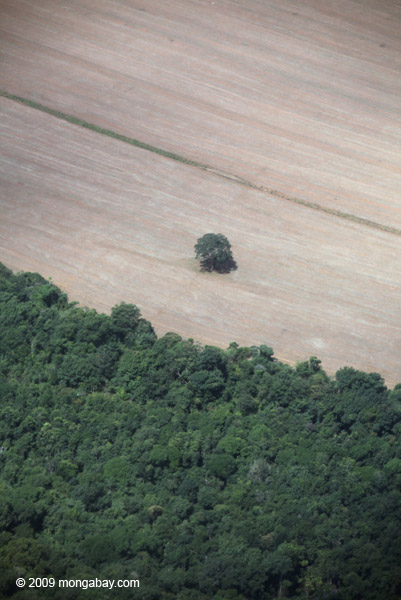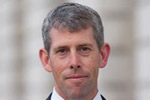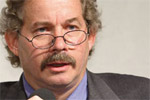Mongabay.com is partnering with the Skoll Foundation ahead of the Skoll World Forum on Social Entrepreneurship to bring a series of perspectives that aim to answer the question: how do we feed the world and still address the drivers of deforestation?
|
HOW DO WE FEED THE WORLD AND STILL ADDRESS THE DRIVERS OF DEFORESTATION? Soy, cattle, rice, palm oil, and logging are the principal drivers of deforestation. As global population increases from 7 billion to 9 billion by 2040, and as more and more people around the world rise out of poverty into the middle class, the demand for these commodities and practices will continue to rise with them. To address these issues, and in advance of the World Forests Summit hosted by the Economist in March, the Skoll World Forum on Social Entrepreneurship partnered with the Stanford Institute for the Environment and Mongabay News to surface the latest insights and innovations at the intersection of deforestation and sustainability. This debate will also set the stage for a larger discussion on deforestation at this year’s Skoll World Forum in Oxford, UK. |
People often associate Brazil with its forests. It’s no wonder given that nearly 60% of the country’s territory is covered by forest and it holds about one-third of the world’s remaining tropical rainforests. You might assume that a country like this would care about educating people to sustainably manage this precious heritage. Well, you’d be wrong!
It is important to recall that Brazil has overcome decades of military intervention that framed the Amazon colonization in sovereignty terms, preaching the occupation of the forest under the slogan “to integrate not to give away”. The result was the destruction of about 18% of the Brazilian Amazon. Most of the clearing was done for grazing cattle, cropland and commercial logging. During this same period, the education system promoted a divorce between young people’s intellects and their environment, as though where one lives has no impact on his or her development. The much sought after urban life, modeled closely on cities of the Northern Hemisphere, did little to foster the art of living well in one’s surroundings.

|
The current shortage of qualified forest management professionals in this immense country, especially in the Amazon, is just one of numerous consequences of these policies that can still be seen today. The International Labour Organization, in its 2008 report, Green Jobs: Towards Decent Work in a Sustainable, Low-Carbon World, noted that fewer than 140,000 – or just over 1% – of the 12.9 million workers employed in the forestry sector worldwide are in Brazil. Other studies, such as the one by the Instituto Floresta Tropical, one of the most recognized forest management training centers in Brazil, reported a lack of workers to effectively manage timber production in the Amazon. Currently, the country needs some 10,000 such workers, but that number could triple within a few years if the amount of training programs in this area does not increase.
At first glance, these statistics may be disheartening, but they actually represent an opportunity. One positive upshot is the rise of a forest education movement, which has the potential to bring the culture, diversity and wisdom of the Amazon communities back into the school curriculum. Cross-sector partnerships led by civil society organizations such as the Roberto Marinho Foundation, the social arm of the Globo media conglomerate, in partnership with Fundo Vale and the Brazilian Forest Service, support this mission. One outcome of these collaborations is ‘Forestability’ (Florestabilidade in Portuguese), an environmental education program that aims to enable young students to envision the potential of forestry careers and care, and focuses on finding solutions to reverse the loss of tropical forests and their ecological systems.
 Andrea Margit Environment Unit Head, Roberto Marinho Foundation Andrea Margit is the Environment Unit Head at Roberto Marinho Foundation where she leads a portfolio of educational projects, including the Forest Management Education; the Watershed Management Initiative; and the Young Scientists Award. Contributed to the development of the curatorial project of the Museum of Tomorrow and co-organized the ‘Social Entrepreneurship Forum in the New Economy’ that took place during Rio+20, in partnership with Ashoka, Avina and the Skoll Foundation. She has worked in environment since 2002 in the fields of learning and communication. She worked in knowledge management at Conservation International in Virginia, U.S. from 2005 to 2008. She has also led the communication strategy of CI Brazil for over 3 years. |
In cooperation with the Secretaries of Education and the Environment, Florestabilidade has been reaching, since the start of this year, thousands of students and communities in the Amazon. Teachers and rural extension personnel are the program’s greatest allies. They receive training on how to include forestry content in the curriculum or when they provide technical assistance to local producers.
The experience of the teachers and technicians speaks to the extent of the challenges involved in training young people to manage Brazil’s forests. There are many accounts, for example, of students who are embarrassed to admit to their classmates that their father is a logger because several campaigns against deforestation have made the job synonymous with illegality and the destruction of nature. We need to readjust our focus and help consumers distinguish between logging that destroys and there must be stopped, and sustainable logging practices, which should be promoted.
Then there is the challenge of helping educators approach the subject of forestry without fear or prejudice. With globalization and urbanization (over 80% of Brazilians live in cities, with an even higher proportion in some Amazon states), we are becoming a population “devoid of place”, as the American professor of Politics and Environmental Studies, David W. Orr, puts it. The environment around us has ceased to be recognized as a source of food, water, energy and inspiration. All these items come to us, miraculously, packaged for consumption. Their relation to the forest is remote or non-existent.
Of course nowadays young people must be ready for life in a global world that values communication and negotiation, and is respectful of choices and diversity. But the education process cannot be disconnected from local culture and responsibilities. Brazil needs to educate young people to manage one of their most valuable assets, the Amazon Forest. Results from socio-environmental programs like Florestabilidade may be seen over the long-term – 10-15 years – but they are crucial to the future of tropical forests. We must face these challenges if we want to put Brazil’s forests in good hands.
To discuss this commentary, please visit The challenge of putting Brazil’s forests in good hands
|
ALL POSTS IN THIS SERIES
Can we meet rising food demand and save forests? (04/03/2013) A few weeks ago the Skoll World Forum hosted an online debate on how increased global consumption can be balanced with sustainability. The debate asks how a rapidly growing world that is ever consuming can hope to feed everyone, and at the same time address the deforestation that is emitting massive amounts of carbon into the atmosphere and destroying the world’s greatest tropical forests. Many contributors made very strong points—even contradicting one another in their approaches and ideas. Strong ‘no deforestation’ commitments save forests and feed people (03/12/2013) As a global community, we have so far failed to answer this most pressing question; we have yet to build our cloud. Deforestation rates are down in some places, but overall, our forests continue to disappear much as they have for the past 50 years, driven principally by increasing global demand for food. Can we feed the world and save our forests? Yes, we can, and the solution lies in the global supply chain and the message some companies are now sending their suppliers: ‘If you cut down trees, I won’t buy your product.’ This has the power to silence bulldozers. It’s already doing so and now it’s time to go to scale. The need to jump-start REDD to save forests (03/08/2013) At least US$7.3 billion has been pledged for REDD+ over the period from 2008 to 2015, with $4.3 billion pledged for REDD+ readiness during the fast-start period alone (2010-2012). In addition to these funds, private investors, private foundations, and others have been channeling financial support to developing countries for REDD+ and related programs for several years now. A promising initiative to address deforestation in Brazil at the local level (03/05/2013) The history of the Brazilian Amazon has long been marked by deforestation and degradation. Until recently the situation has been considered out of control. Then, in 2004, the Brazilian government launched an ambitious program to combat deforestation. Public pressure—both national and international—was one of the reasons that motivated the government to act. Another reason was that in 2004, deforestation contributed to more than 55 percent of Brazil’s total greenhouse gas emissions, making Brazil the fourth-largest greenhouse gas emitter in the world. Saving forests by putting a price on them (03/04/2013) During the 2013 SuperBowl, the championship game of the US National Football League, a truck company aired an advertisement that likened farmers to God’s favorite assistant. It suggested that when God needs something tough, or gentle, done, he calls a farmer. The narration, taken from a speech given to the Future Farmers of America in 1978 by Paul Harvey, a radio host, plays directly to the near mythical stature of farmers and ranchers in American culture and their deep connection to nature. Saving forests by stemming agricultural sprawl (03/01/2013) I’m fortunate to travel the world helping conserve habitats for some of the world’s most iconic species. When I visit places like the Amazon and Sumatra, I’m still awestruck by their diversity and pristine beauty. I’m also reminded how threatened they are. Our growing demand for food and fiber is fueling deforestation in resource-rich regions of the world. As environmentalists, if we don’t change where and how we produce food and fiber, we can turn off the lights and go home. There won’t be any biodiversity left to protect. Can saving forests help feed the world? (02/28/2013) As world population climbs from 7 to a projected 9 billion people and emerging and developing economies demand ever more of the food and fiber that drive deforestation, many environmentalists ask with increasing urgency whether and how tropical forests can survive. But the question may actually be whether and how the world’s increasing, and increasingly rich, population can be fed unless tropical forests survive. The challenge of putting Brazil’s forests in good hands (02/28/2013) People often associate Brazil with its forests. It’s no wonder given that nearly 60% of the country’s territory is covered by forest and it holds about one-third of the world’s remaining tropical rainforests. You might assume that a country like this would care about educating people to sustainably manage this precious heritage. Well, you’d be wrong! The corporate conservation revolution (02/27/2013) There’s a new kind of environmental hero emerging. They don’t live in Washington, D.C., and they’re known more for their interest in increasing earnings than in reducing greenhouse gases. They are found in an unlikely place: The Corporate Boardroom, and they’re making a big difference in saving the worlds forests and our climate. In recent years, a group of visionary corporate leaders have been quietly teaming up with a growing number of environmental groups to take a hard look at what’s left of our planet’s natural resources. Together, they agree: we are past the point where our land and oceans can meet the food, energy and commodity demands of our planet’s seven billion inhabitants. |
Editor’s note: The opinions expressed in this op-ed do not necessarily reflect the views of Mongabay.com or its staff. Mongabay founder, president, and editor Rhett A. Butler served as an advisor to the Skoll Foundation from 2010-2012.
Related articles








